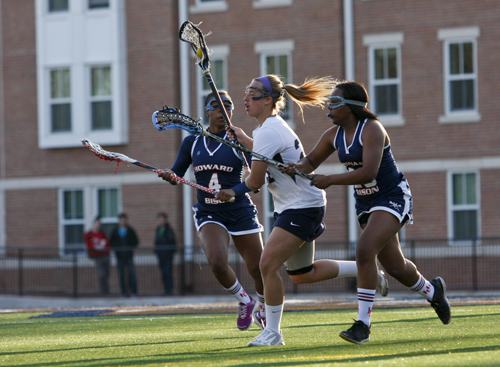
By Onyekachi Akalonu, Staff Reporter
As the year draws to a close, high school students everywhere are looking ahead at what the new year will entail. Prom, senior trips and ditch days, and most importantly, college acceptances, become the focal points of the new year as a new graduate class steps onto the collegiate landscape. The choice in where to go to college comes with several factors, such as financial affordability, closeness to home and student resources. However, this choice becomes all the more complex for high school athletes looking to play on the collegiate level.
For a student-athlete, the name of the school and its ability to send players into professional athletics is just as important as the condition of its classroom facilities. This proves to be the main reason why top black college prospects are less inclined to go to Historically Black Colleges and Universities. Top athletic colleges, such as Louisiana State University or Duke University, have solidified their marks as the go-to schools for the best athletes in the world. The alumni they boast also add to their extensive list of pros for high school athletes deciding where to take their talents.
For example, the University of Connecticut basketball jersey was once worn by the likes of NBA Legend Ray Allen and current NBA Stars, Kemba Walker and Rudy Gay. Peyton Manning and Reggie White were both members of the University of Tennessee at Knoxville football team before they were world-renowned greats. For any high school athlete with dreams of becoming a pro, going to these types of schools seems like the automatic choice; the line of thinking that if the school can produce greats like Peyton Manning or Ray Allen, then they too can be great there. However, I believe that this line of thinking only looks at a very small part of the whole picture.
Division 1 schools account for a majority of the profit revenue seen by the National Collegiate Athletic Association (NCAA). In 2017, the NCAA reported $1.1 billion in revenue, with most of it coming from its March Madness Men’s Basketball Tournament. According to a Forbes study in March of 2019, the top five college basketball programs report an average of $30 million per year in revenue with Louisville reporting the most, over $50 million a year. This money stems from sponsorship from big name athletics companies like Nike and Under Armour as well as major network deals with CBS Sports and Turner Broadcasting.
The amount of money and exposure poured into these schools’ athletic programs becomes all the more shocking when realized that almost all of these big-name schools are predominantly white institutions. This is especially jarring since, in the 65 schools that make up the top athletic conferences, only 2.4 percent of the undergraduate population are black men while they make up more than 50 percent of the athletic teams. We have seen this same plot again and again throughout history; the exploitation of black talent for white profit. I am not downplaying the statuses of these top institutions, however, it is imperative that we as a people look to preserve not only our talent, but our ownership of talent.
While Louisville, with its 10.2 percent black student enrollment, is able to bring in $30 million in profit yearly on the talents and dedication of its black athletes, HBCUs collectively only rake in a fraction of this amount. While these big-name schools definitely have set their names in stone, it is important to realize that the student-athlete is a student first and their experience while at school with ultimately help shape how they view themselves as players and people in the world. I believe the cultural incubation of Black society that is bred on every HBCU campus that would benefit greatly from the presence of major athletic sponsor and viewership.
Imagine if Xavier University of Louisiana was consumed with the same competitive fervor that graces University of Michigan’s football stadium every week. What if Howard’s and Hampton’s rivalry was on full display in nationally televised tournaments? Yes, HBCUs have their own woes, both financially and administratively, but we cannot ignore that these problems are also prevalent in predominantly white institutions. The same year that former Howard University student, Tyrone Hankerson Jr., allegedly embezzled over $400,000 from the financial aid accounts of fellow Bison, Columbia University former director of financial aid, Melanie Williams-Bethea, was accused of having received over $300,000 in kickbacks from over-compensated student stipends.
Additionally, in recent years, with the rise of public white supremacist sentiments, the predominantly white institution has become a place of debate and, oftentimes conflict, between white and non-black students. While they cheer on their black student shooting a jump shot, white students are either active or passive in racism and discrimination at their schools. The appreciation for Black students at predominantly white institutions too often starts and stops on the field, reason enough for top high school athletes to at least consider attending an HBCU. For a collection of higher education options that produce the highest number of black professionals, I believe it is also imperative that we produce the highest number of professional black athletes as well.

